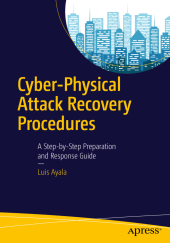 Neuerscheinungen 2016Stand: 2020-02-01 |
Schnellsuche
ISBN/Stichwort/Autor
|
Herderstraße 10
10625 Berlin
Tel.: 030 315 714 16
Fax 030 315 714 14
info@buchspektrum.de |

Luis Ayala
Cyber-Physical Attack Recovery Procedures
A Step-by-Step Preparation and Response Guide
1st ed. 2016. xx, 159 S. 1 SW-Abb., 2 Farbabb. 254 mm
Verlag/Jahr: SPRINGER, BERLIN; APRESS 2016
ISBN: 1-484-22064-1 (1484220641)
Neue ISBN: 978-1-484-22064-1 (9781484220641)
Preis und Lieferzeit: Bitte klicken
This book provides a template with step-by-step instructions on how to respond and recover when hackers get into your SCADA system and cause building equipment to act erratically or fail completely. When hackers shut off the water, turn off the building power, disable the sewage effluent pumps and activate the fire alarm, you have to do something quick. It is even more alarming that hackers can do all those things at the same time-even from the other side of the planet.
Not every equipment failure or power outage is a cyber-physical attack. When your building is attacked, you probably won´t suspect it was a hacker-until you see a pattern. The building control system (BCS) will act "squirrelly" and you will know-it really is a cyber-physical attack.
Once a cyber-physical attack occurs, it can mean years of court cases, job losses, higher insurance rates, and maybe even criminal litigation. It also takes years to overcome the loss of safety credibility to your employees and the local community. Cyber-Physical Attack Recovery Procedures provides a detailed guide to taking the right steps ahead of time, and equipping your facility and employees with the training, knowledge, and tools they need and may save lives.
The book contains:
A one-of-a-kind action plan describing how hackers attack building equipment, the extent of damage possible, and how to respond when a cyber-physical attack occurs.
Detailed descriptions of cyber-physical attacks directed against SCADA systems or building controls, as well as cyber booby traps
Invaluable appendices, including: Emergency Procedures, Team Staffing and Tasking, Alternate Site Procedures, a Documentation List, Software and Hardware Inventories, Vendor Contact Lists, External Support Agreements, and much more.
What you´ll learn
Possible ways hackers can cause building equipment to fail.
How to quickly assess the threat to his facilities in real time, how to stop a cyber-physical attack.
How to restore equipment operation without doing any more damage.
Who This Book Is For
Architects, Engineers, Building Managers, Students, Researchers and Consultants interested in cybersecurity-attacks against facilities in the real world. Also for IT professionals getting involved in cybersecurity responsibilities.
Chapter 1: Cyber-Physical Attack Recovery Procedures.- Chapter 2: Threats and Attack Detection.- Chapter 3: Prevent Hackers from Destroying a Boiler.- Chapter 4: Prevent Hackers from Destroying a Pressure Vessel.- Chapter 5: Prevent Hackers from Destroying Chillers.- Chapter 6: Prevent Hackers from Destroying a Gas Fuel Train.- Chapter 7: Prevent Hackers from Destroying a Cooling Tower.- Chapter 8: Preventing Hackers from Destroying a Backup Generator.- Chapter 9: Prevent Hackers from Destroying Switchgear.- Chapter 10: Eight Steps to Defend Building Control Systems.- Chapter 11: Block Hacker Surveillance of your Buildings.- Chapter 12: Cyber-Physical Attack Recovery Procedures Template.-
Luis Ayala worked over 25 years for the Department of Defense with the past 11 years at the Defense Intelligence Agency. Prior to his appointment as a Defense Intelligence Senior Leader in 2008, he held several leadership positions at the Branch and Division levels.
His tenure culminated with the position as Senior Technical Expert (facilities/construction). Mr. Ayala earned his Bachelor of Architecture degree from Pratt Institute and he received his Master of Science and Technology Intelligence from the National Intelligence University. NIU is the Intelligence Community´s sole accredited, federal degree granting institution. His Master´s thesis titled "Cybersecure Facilities for the Intelligence Community" is classified. Mr. Ayala was awarded the DIA Civilian Expeditionary Medal and the Civilian Combat Support Medal.


